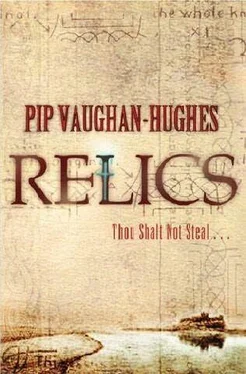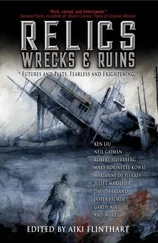Pip Vaughan-Hughes - Relics
Здесь есть возможность читать онлайн «Pip Vaughan-Hughes - Relics» весь текст электронной книги совершенно бесплатно (целиком полную версию без сокращений). В некоторых случаях можно слушать аудио, скачать через торрент в формате fb2 и присутствует краткое содержание. Жанр: Исторический детектив, на английском языке. Описание произведения, (предисловие) а так же отзывы посетителей доступны на портале библиотеки ЛибКат.
- Название:Relics
- Автор:
- Жанр:
- Год:неизвестен
- ISBN:нет данных
- Рейтинг книги:4 / 5. Голосов: 1
-
Избранное:Добавить в избранное
- Отзывы:
-
Ваша оценка:
- 80
- 1
- 2
- 3
- 4
- 5
Relics: краткое содержание, описание и аннотация
Предлагаем к чтению аннотацию, описание, краткое содержание или предисловие (зависит от того, что написал сам автор книги «Relics»). Если вы не нашли необходимую информацию о книге — напишите в комментариях, мы постараемся отыскать её.
Relics — читать онлайн бесплатно полную книгу (весь текст) целиком
Ниже представлен текст книги, разбитый по страницам. Система сохранения места последней прочитанной страницы, позволяет с удобством читать онлайн бесплатно книгу «Relics», без необходимости каждый раз заново искать на чём Вы остановились. Поставьте закладку, и сможете в любой момент перейти на страницу, на которой закончили чтение.
Интервал:
Закладка:
What I meant was that, if Ursula is a myth, how can one of her companions' bodies exist?' 'How indeed? But it seems that Cordula, at least, was real.'
'Saint Cordula has turned up. And how about the other ten – excuse, me Adric, eleven virgins? That, I will admit, is a powerful lot of virgins, dead or not.'
'Oh, come on, Petroc. You used to like nosing around after old bones – remember? And remember what business the Captain – and you, nowadays – are in. I say again: the body of Saint Cordula has been found, or its whereabouts learned. A long-dead girl forgotten on an island – that is the centre of our maze.'
Adric paused again, and I grinned. He had me, as he always did in the end.
Well then, dear friend, please tell me about poor Cordula and her part in our downfall.'
He grinned in turn, and Elfsige of Frame's bony visage flashed in my mind. Waving for more wine, he settled down to tell his tale.
'In a land far away – England, dear boy – there was a bishop whose luck it was to land a rich, fat diocese in a city full of scholars. He had a palace, soldiers, servants and, best of all, a great cathedral, many years in the building and newly finished. What more could he want?
'But this was a greedy man. He saw that his fine cathedral, although it gloried God with every stone and crumb of mortar, was not bringing enough glory to him. Or money. For although it had many wonders, it lacked one important thing: a relic powerful enough to draw pilgrims. Its saint, a local martyr, had local affection but no draw outside the county. The Bishop looked towards Chartres and Canterbury and felt nothing but the grimmest envy.
'The Bishop had a right-hand man, a crusader knight returned from Outremer who was a little headstrong but willing and able to do whatever the Bishop needed doing, in return for money and, better, power over others. The Bishop enlisted this man in his quest for a great relic. This had to be small but important – an apostle's finger, a tooth of the Baptist – or less important but big: enough to fill a coffin, enough to parade through the streets.
'All familiar enough so far? Good. Now, the problem with relics is that entire saints are hard to come by – most of them are in little bits and pieces these days. There are holy corpses by the bushel in the East, but here in the Holy See, those schismatic Greek saints aren't worth more than the price of their winding cloths, and then only to the oakum man. The really big prizes went centuries ago – you'll know all about Saint Mark.
'But then all of a sudden, a scholar in Germany – a pupil of Albert of Cologne, in fact, Albertus Magnus, a charming fellow I had the good fortune to meet a few weeks ago… your pardon, Petroc. This scholar – who happened to be an Englishman studying abroad – while working on the life of Saint Ursula, discovered a clue buried far down in the archives of a monastery outside Cologne – that the body of Cordula had been carried away from the place of execution by a mercenary of the Huns, a Greek soldier who saw the martyrdom and saved the remains from the barbarians, who seem to have disposed very efficiently of most of the other eleven virgins – or perhaps the eleven thousand. This soldier made his way back to his home on an island in Greece, where he set up a church in Cordula's honour. As I'm sure you know, the Greeks have always done things very differently to us, and in their Schismatic way they made Cordula a Greek saint. I would imagine that, on a small island, the local folk forgot her origins very quickly and made her a daughter of the village. Her name was lost in a foreign tongue, and so she disappeared for perhaps a thousand years.'
'But she is not very important, is she, Adric? A very minor saint, surely?' 'Ah – there you have it – the small, simple thing at the centre of it all: a long-dead girl. You would seem to be right. But Ursula's cult is not minor in the least. It brings a great deal of gold to Cologne – virgins come from all over Christendom to seek her protection. She has her own order of nuns. And around a century ago someone conveniently turned up a great cache of bones – apparently those of the virgin army – which Cologne has been busily selling off ever since. No, a complete virgin of Ursula would be a find indeed. There are always virgins in need of protection, dear boy…' And he shot me a look. 'So I've heard,' I answered carefully.
'Quite.' He coughed discreetly into his fist. And then this fellow found Cordula, or at least picked up her trail. Our world – the scholarly world – is very, very small, Petroc, and word gets around. It reached the Bishop of Cologne, and very soon your very own Bishop of Balecester was hatching schemes. With all those scholars at his beck and call, he started some research himself, and dug up some facts, so called, of his own. Most people know that Ursula came from Britain, and so did her virgins. But imagine his surprised delight – so very surprised he was, Petroc, and delighted – when his scholars uncovered the name of Cordula in the Balecester city records! Imagine… Pure serendipity. Ours is a tale of serendipity, is it not?
'Now the Bishop must have Cordula for himself. But he doesn't know exactly where she is. The Cologne trail goes cold in the Ionian Islands – a small enough area, but a lot of islands, and many, many churches and saints. For in Greece, so I've been told, a village may have a church to Saint John, but it won't necessarily honour the Baptist. More likely it is some local man, a holy Yanni who performed some small miracle or renounced the world and lived in an olive tree or some such. It doesn't take an army of virgins to impress a Greek peasant.
'There is one man in the world who can find a lost saint, and the Bishop needs him. The legendary dealer in holy relics, known to some as Jean de Sol, to many as the Frenchman, and to a very few as Captain de Montalhac. The problem is that this man is almost as mythical as the relics he procures – did I say mythical? I meant elusive. He appears when needed, and is invisible otherwise. The princes and church-lords who are his customers never question his integrity – they need his wares too badly. He has the gratitude of kings and popes and, it is whispered, the ear of the Stupor Mundi, wonder of the world, the Emperor Frederick. The Bishop is no fool. He knows that Cordula will be in demand, and that the Frenchman is most probably on her trail on someone else's – without a doubt, the Bishop of Cologne's – behalf. But Sir Hugh believes he can find him and by fair means or foul, lay hands on Cordula for Balecester cathedral.'
'But what did this have to do with Deacon Jean? You said Kervezey meant to kill him.'
'The Deacon was recently returned from Cologne, where he had been studying under the great Albert, whom I believe I've mentioned. Yes. And…' '… He was the scholar who found Cordula. Oh, God.'
'Exactly. Sought out for special advancement by his lordship the Bishop to keep him close. But Balecester found that the Deacon had promised the relic to Cologne, and decided to get rid of him. Now, I think I'm allowed to tell you – this is going to sound rather alarming – that a little while before you became involved, the Captain was approached, through his system of intermediaries, by the Bishop. Only a very few of his most powerful clients, and by that I mean emperors and even popes, ever meet him in person. The intermediaries ensure that his identity remains a secret from all lesser mortals, and the Bishop of Balecester certainly counts as one of those. Anyway…'
Wait, wait! The Captain is working for the Bishop? How can that possibly be?' 'Dear boy, the Bishop is exactly the kind of person who requires the Captain's services: someone whose dignity and importance are in inverse proportion to their wealth and self-regard. In any case, he is hardly working for him. He has agreed to provide him with something.' 'Cordula.'
Читать дальшеИнтервал:
Закладка:
Похожие книги на «Relics»
Представляем Вашему вниманию похожие книги на «Relics» списком для выбора. Мы отобрали схожую по названию и смыслу литературу в надежде предоставить читателям больше вариантов отыскать новые, интересные, ещё непрочитанные произведения.
Обсуждение, отзывы о книге «Relics» и просто собственные мнения читателей. Оставьте ваши комментарии, напишите, что Вы думаете о произведении, его смысле или главных героях. Укажите что конкретно понравилось, а что нет, и почему Вы так считаете.












